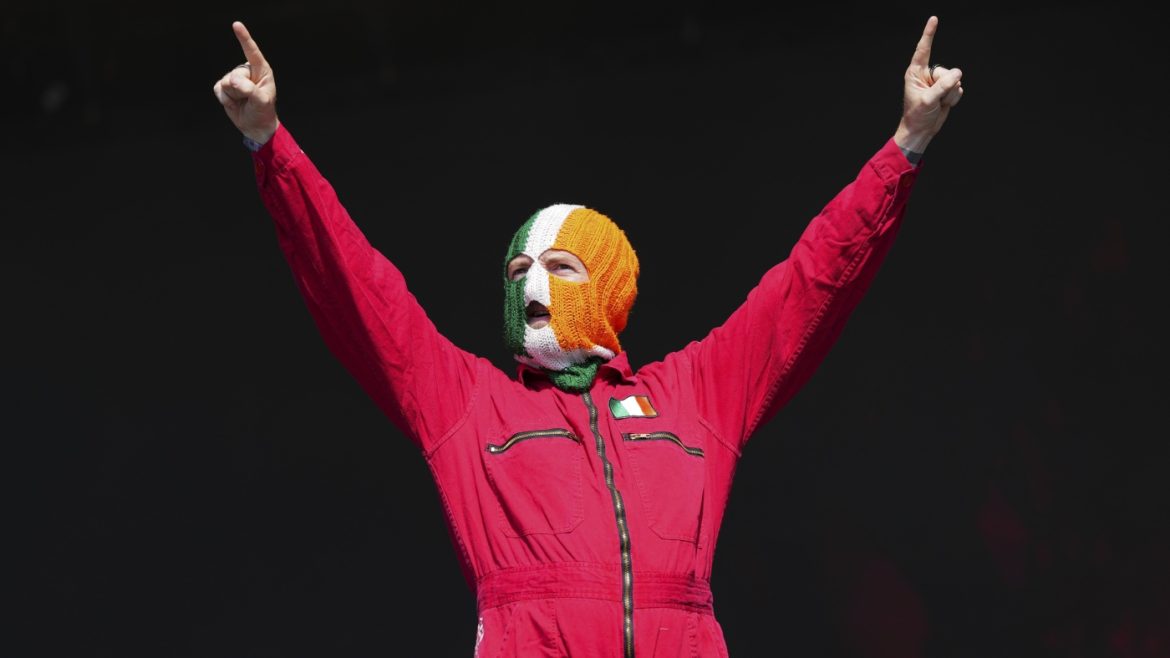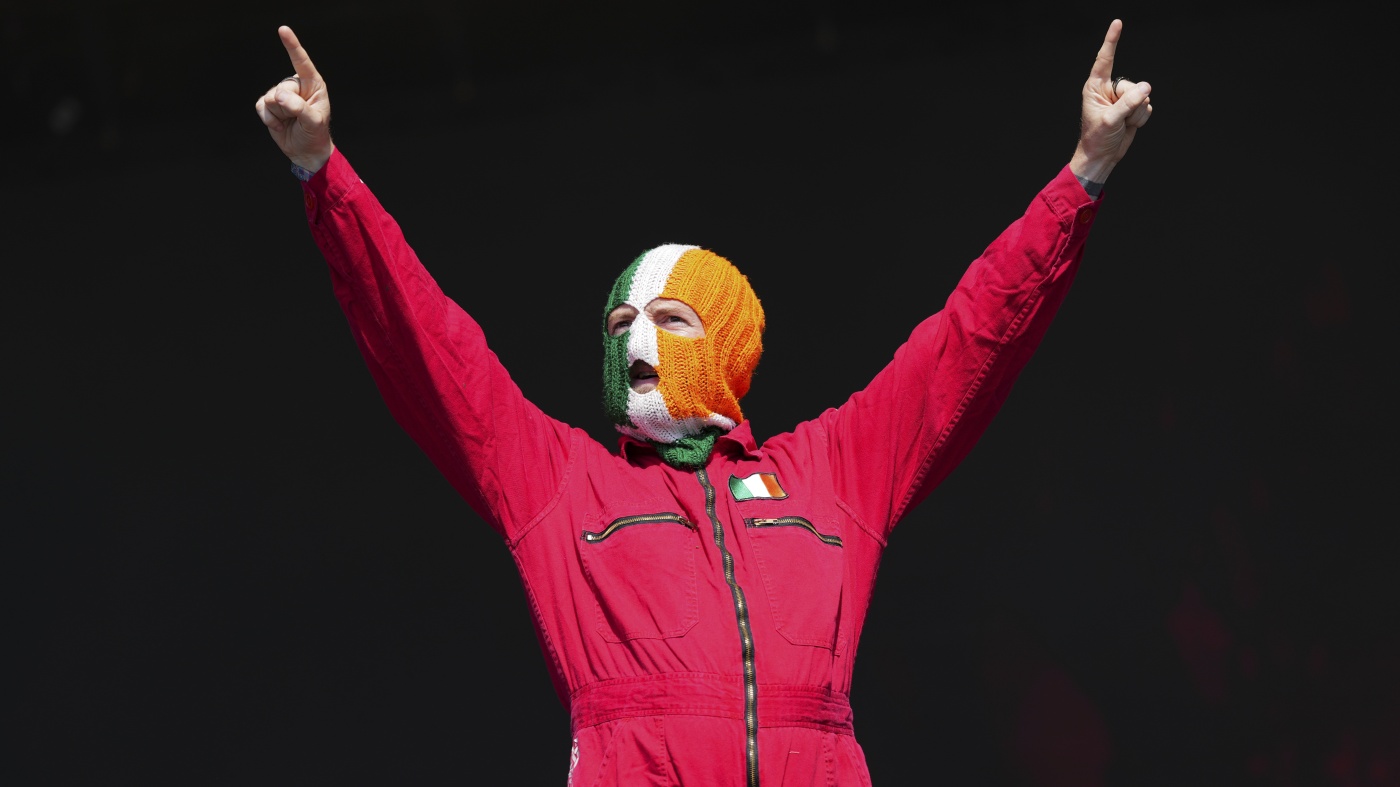Kneecap’s performance at the Glastonbury Festival has become a focal point for discussions about music, politics, and cultural identity in Northern Ireland. The trio, known for their Irish-language rap and politically charged lyrics, brought a unique energy to the stage, sparking both admiration and controversy. Their appearance at one of the world’s most prestigious music festivals highlights the evolving landscape of Irish-language music and the ongoing struggle for cultural and political expression in Northern Ireland.
Kneecap’s Unique Position in Irish-Language Music
Kneecap has carved out a distinctive niche in the Irish-language music scene, particularly within the hip-hop genre. Historically, hip-hop has been dominated by English-language artists, making Kneecap’s rise a significant development. The group, originating from West Belfast and Derry, delivered a performance at Glastonbury that was both vibrant and defiant, blending satirical lyrics with a rebellious spirit. Their decision to rap primarily in Irish is not just a musical choice but a statement about the language’s relevance in contemporary culture.
The trio’s music reflects a mix of youthful defiance, local pride, and political commentary. Through clever symbolism and coded references tied to the Irish republican movement, Kneecap addresses the complexities and tensions that persist in Northern Ireland. Their work resonates deeply with younger generations who are navigating the legacy of conflict while seeking to establish a new cultural identity that embraces their heritage without apology.
The Political Backdrop and Controversy
Kneecap’s association with Irish republican symbolism has drawn significant scrutiny and polarized opinions. The group’s lyrics and imagery are often linked to the historical struggle for a united Ireland, a topic that remains highly sensitive in Northern Ireland. The region’s troubled history, marked by decades of sectarian violence and over 3,600 lives lost, continues to influence political and social discourse.
British politicians, including Prime Minister Keir Starmer, have criticized the band’s inclusion at Glastonbury, expressing concerns about the potential glorification of militancy and the political messages in their lyrics. The controversy was further fueled by recent terror allegations involving one member of the group, although the focus during the festival remained on the music and performance itself.
The debate over Kneecap’s presence at Glastonbury underscores the ongoing tensions surrounding expressions of Irish republicanism in mainstream events. However, the festival organizers’ decision to proceed reflects a broader trend toward inclusivity, recognizing the importance of diverse and even contentious voices in the arts. This move highlights the complex role of music as both entertainment and a form of political expression.
Resonance with Audiences and Cultural Significance
Despite the controversy, Kneecap’s performance at Glastonbury drew tens of thousands of attendees, who responded with enthusiasm and appreciation. The crowd’s warm reception indicates a growing appetite for music that challenges the status quo and offers insight into the lived experiences of Northern Irish youth.
Beyond entertainment, Kneecap’s music serves as a vehicle for cultural revival, particularly in promoting the Irish language’s contemporary relevance. Their rapid-fire delivery, evocative storytelling, and fusion of traditional narratives with modern beats create a unique space where historical memory and current realities intersect.
The choice of Glastonbury as a platform amplifies the group’s message far beyond Northern Ireland. By performing at a global festival with a diverse and international audience, Kneecap invites listeners worldwide to engage with issues of identity, language, and unresolved political conflicts from a new perspective. This global exposure frames their work through the lens of creative expression, fostering a deeper understanding of Northern Ireland’s complexities.
Media and Broadcast Reception
The potential streaming of Kneecap’s Glastonbury set by the BBC signals further recognition of the group’s impact and the public interest surrounding their performance. Media coverage has been intense and often polarized, reflecting broader debates about free speech, artistic expression, and political sensitivity in the arts.
The coverage has highlighted the role of hip-hop as a powerful medium for marginalized voices and its capacity to challenge dominant narratives. Kneecap’s presence at one of the largest music festivals globally represents a milestone for Irish-language hip-hop, which has historically been underrepresented. Their performance at Glastonbury not only showcases their talent but also underscores the importance of giving voice to underrepresented communities.
Conclusion: A Defiant and Symbolic Moment in Music and Culture
Kneecap’s Glastonbury performance stands as a defining moment, not just for their career but for the cultural and political dialogue it embodies. The blend of artistic innovation, linguistic pride, and controversial symbolism encapsulates the complex realities of Northern Ireland’s past and present.
Their ability to command a prominent stage despite criticism underscores the transformative power of music to confront difficult histories and inspire new conversations. Whether viewed as provocateurs or cultural ambassadors, Kneecap undeniably symbolizes a dynamic and evolving cultural identity—one that embraces both heritage and modern rebellion.
As Kneecap continues to challenge boundaries and engage with socio-political themes through Irish-language rap, their work will likely remain a potent touchstone for discussions about identity, conflict, and expression in Northern Ireland and beyond. Their Glastonbury set was more than just a concert; it was a statement of presence, resistance, and hope for a new generation seeking to define itself on their own terms.


